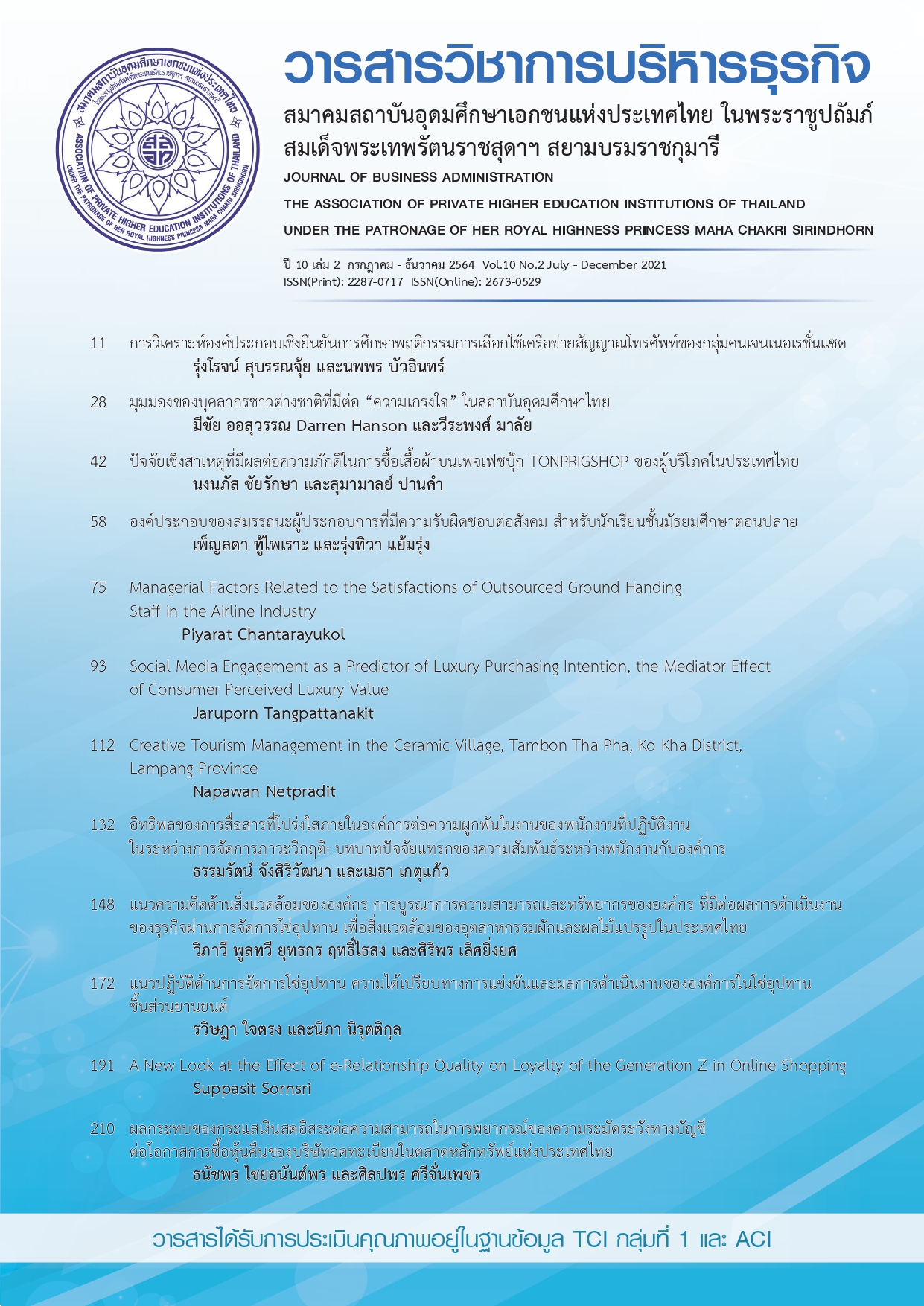Competency Factors for Entrepreneurial Social Responsibility at Upper Secondary School Students
Keywords:
Entrepreneur Social Responsibility, Competency FactorsAbstract
The objective of this study was to study the component of competency based entrepreneurial social responsibility by using the research process to: 1) analyze and synthesis of academic documents and review of related literatures, 2) have an in-depth interview of 5 entrepreneurial experts in social responsibility; and 3) synthesis of results from in-depth interview to generate the component of competency based entrepreneurial social responsibility. This component was considered the validity by using 3 measurement and evaluation experts to verify Index of item objective congruence IOC) in order to meet the component of competency based entrepreneurial social responsibility requirement.
The results revealed that competency based entrepreneurial social responsibility refers to individual desirable characteristics, which are knowledge, skills, competence; and positive attitudes on job performance in different positions. In terms of component of competency based entrepreneurial social responsibility can be divided into 3 aspects: knowledge aspect, skills aspect; and competence aspect. These aspects are described as: 1 Knowledge aspect, which consists of 1.1 knowledge of the importance of entrepreneurs, 1.2 duties of entrepreneurs, and 1.3 analysis of entrepreneurship; 2. Skill aspect, which consists of 2.1 Thinking skill -problem solving and decision making; and creative thinking, 2.2 Communication skill and 3. Characteristic/trait which consists of 3.1) self-confidence 3.2) risk taker 3.3) discipline 3.4) patience, and 3.5) social responsibility concern.
References
Arunphu, S. (2014). The study of desirable competencies of successful entrepreneurs in service business of counter service company limited. Panyapiwat Journal, 5(2), 90-102
Bangmo, S. (2010). Entrepreneurship. Bangkok: SK Books Publishing House.
Bendig, M., Unterberg, M., & Sarpong, B. (2012). Overview of the Microcredit Sector in the European Union for the Period 2010–2011. Brussels: European Microfinance Network.
Birnaz, O. N. a. N. (2019). Model of Forming Mathematical Notional-terminological Apparatus in Elementally school Children. Moldova: Russia & Free International University of Moldova.
Bacigalupo, M. (2106). The Entrepreneurship Competence Framework. Retrieved from file:///C:/Users/Win10x64Bit/Downloads/lfna27939enn%20(2).pdf
Eager, B., Grant, S., & Maritz, A. (2017). Time-orientation as a Precursor to Coping Responses in Entrepreneurs. International Journal of Organizational Innovation, 10(2), 6-12.
Eua-Arporn, W. (2017). DNA CSR. Bangkok: Fah Rattanamongkhon Publishing House.
Department of Business Development. (2019). Business registration December 2019. Retrieved from https://www.dbd.go.th/news_view.php?nid=469416833.
Group, W. B. (2019). Doing Business 2019 Training for Reform. Retrieved from https://www.doingbusiness.org/content/dam/doingBusiness/media/Annual-Reports/English/DB2019-report_web-version.pdf.
Gustavo, B. (2019). Entrepreneurial Competencies and Strategic Behavior: a Study of Micro Entrepreneurs in an Emerging Country. Scholarly Journal, 16(3), 255-272
Holienka, M. (2014). Youth entrepreneurship in Slovakia: a GEM based perspective. Comenius Management Review, 8(2), 41-50.
Hofer, A. R., & Delaney, A. (2010). Good Practices in Local Youth Entrepreneurship Support. Retrieved from https://www.researchgate.net/publication/46457371
Hisrich, R. D. (1990). Entrepreneurship/intrapreneurship. American Psychologist Journal, 45(2), 209–222.
Kabir, M. (2017). Entrepreneurial Competency As Determinant For Success Of Female Entrepreneurs In Nigeria. Indonesian Journal of Business and Entrepreneurship, 3(2). 143-151
Kiatkun, J. (2021). Self Confidence. Retrieved from http://swis.acp.ac.th/html_edu/acp/temp_informed/1928.pdf
Mamun, A. A. (2019). Entrepreneurial knowledge, skills, competencies and performance A study of micro-enterprises in Kelantan, Malaysia. Retrieved from https://www.emerald.com/insight/content/doi/10.1108/APJIE-11-2018-0067/full/pdf
Ministry of Education Thailand (2018). Basic Education Core Curriculum. Retrieved from https://drive.google.com/file/d/1SjQZqQbmU52DP1ODySpOmVEcUzW-7xP7/view.
Office of the Education Council. (2018). Entrepreneurship Education. Retrieved from http://backoffice.onec.go.th/uploads/Book/1575-file.pdf.
Phuanpoh, Y. (2019). Risk Management in Small and Medium Enterprises. Journal of Management Science Review, 1(1), 191-199
Prats, J. (2020). Three competencies evrey entrepreneur should develop. Retrieved from https://www.ideasforleaders.com/ideas/three-competencies-every-entrepreneur-should-develop
Prawatrungruang, S. (2017). Decision Making Techniques in Business. Journal of Humanities and Social Sciences Thonburi University,8(16), 152-159.
Rubene, Z. (2021). Self-Assessment of the Entrepreneurial Competence of Teacher Education Students in the Remote Study Process. Scholarly Journal, 13(11), 1-14
Suroso, A. (2017). Optimizing SMEs’ Business Performance Through Human Capital. European Research Studies Journal, 20(4), 588-599.
Sorasermsombat, P. (2017). Influence of Psychological Factors on Business Start-ups of Hotel Entrepreneurs in Thailand. Journal of Management Science Chinghai Rajabhat University, 12(2), 17-41.
Srisa-Ard, B. (2012). Self-discipline and related research. Journal of Education Measurement Mahasarakham University, 17(1), 3-15.
Srivarom, K. (2019). The Concept of Knowledge Management. Journal of Association of Professional Development of Educational Administration of Thailand, 1(14),41-50.
Stawetin, L. (2021). Public Relations Works and Reputation Building for Organization. Retrieved from https://www.bu.ac.th/knowledgecenter/executive_journal/jan_mar_11/pdf/aw27.pdf.
Tanhakorn, T. (2018). Success Factors for Creative Entrepreneurs in the Creative Economy. Veridian E Journal, Silpakorn University, 11(1), 396-410.
Vashararangsi, P. (2017). The Students Competencies and Attributes as Entrepreneurs in MBA Program in Benjamitr Universities Consortium. Journal of Humanities and Social Sciences Rajapruk University, 3(2), 116-126
Zarefard, M., & Cho, S. (2017). Relationship between Entrepreneurs’ manageril Eompetencies and Innovative start-up intention in university student. International Journal of Entrepreneurship, 21(3), 1-19.

Downloads
Published
How to Cite
Issue
Section
License
บทความที่ลงตีพิมพ์ในวารสารวิชาการบริหารธุรกิจ สมาคมสถาบันอุดมศึกษาเอกชนแห่งประเทศไทยต้องเป็นบทความที่ไม่เคยได้รับการตีพิมพ์เผยแพร่ หรืออยู่ระหว่างการพิจารณาตีพิมพ์ในวารสารอื่นๆ การละเมิดลิขสิทธิ์เป็นความรับผิดชอบของผู้ส่งบทความโดยตรง

